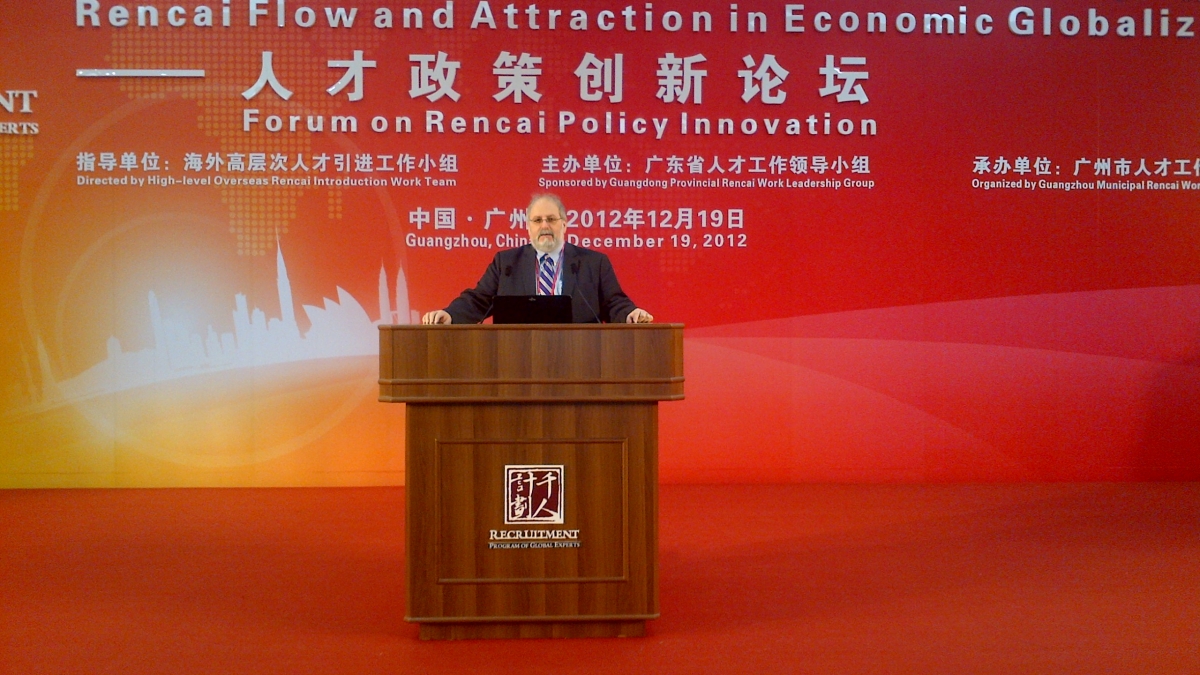ASU's Simon addresses Chinese Talent Fair

Denis Simon, ASU vice provost for International Strategic Initiatives, recently gave a keynote presentation at the 15th Annual Guangzhou (China) Talent Fair.
The fair, which is organized by the Organization Department of China’s Communist Party and its local counterparts in Guangdong province, as well as China’s State Council’s Foreign Experts Bureau, serves as a platform for bringing together leading experts and practitioners concerned with the supply, demand and effective utilization of high-end professionals.
Simon co-authored the first comprehensive study in more than 40 years of China’s scientific and technical talent pool, “China’s Emerging Technological Edge,” Cambridge University Press, 2009.
The talent issue has taken on growing importance since 2006, when Chinese leaders announced the need for the domestic economy to place greater emphasis on research, development and innovation as the new main drivers of economic growth for the future. In spite of some modest successes, attracting qualified talent capable of spearheading China’s new innovation thrust, however, has remained a major challenge for Beijing, Simon said.
“Without an adequate pool of well-trained entrepreneurial talent that is relatively risk averse and undaunted by the threat of commercial failure, China’s innovation machine will lack the critical ingredient needed to boost the country into the ranks of the world’s most innovative nations,” Simon said. “Chinese officials have been making a concerted effort under the so-called ‘1000 Talents Program’ to attract a contingent of Chinese scientists and engineers who have been living and working abroad to return China to become the country’s innovation vanguard.
"That program now has been extended to include a ‘1000 Talents Program for Foreigners’ to further enable China to reach beyond the Chinese ethnic diaspora and to tap into the creativity and innovative thinking of some of the world’s leading minds irrespective of their national origins.”
Simon noted that there is a certain irony in China’s new talent policies insofar as while Chinese officials are actively engaged in an aggressive global recruitment program, so too are many other countries. Some countries are being driven to seek talent from abroad, including Chinese talent, to overcome demographic changes in their population, while others are simply seeking to gain a more sustainable competitive edge as the focus of international competition shifts away from “brawn” and more towards brainpower, especially among emerging market economies. Simon pointed to some of the ongoing efforts in the United States, in particular, where there is an active discussion about how to adjust American immigration policies to take greater advantage of the large pool of foreign students who come to the country for advanced study but often find it hard to secure the necessary visas to remain in the United States.
“We might be in the midst of a huge sea change in American thinking as more and more political leaders and members of the business community recognize the need for the U.S. to remove many of the prevailing obstacles to increased internationalization of the U.S. talent pool,” Simon said.
One issue raised by Simon and several other speakers was the question of if the world is headed for a series of new global talent wars.
“The implications for the U.S. and China could be profound but only if we look at talent as a zero sum game,” Simon said. “There is a huge pool of talented persons constantly moving across the Pacific between the U.S. and China on a regular basis. Bilateral academic, education and research collaboration have been steadily increasing and the prospects for expanded cooperation are even greater as both countries seek to promote technological advances in the fields of clean energy, life sciences, and information technology.”
He added that in an age of globalization, the idea of a so-called “national” talent pool already may have become obsolete. Rather, the new focus should be on working with and tapping into the rapidly emerging “global talent pool” that is characterized by significant individual mobility and steady cross-border flows of highly qualified persons with advanced training and work experience.
“In the currently evolving world of global talent, the new focus necessarily is on networks of individuals working across borders and cultures connected by information technology infrastructures that allow for instantaneous communication of information and ideas,” Simon added.